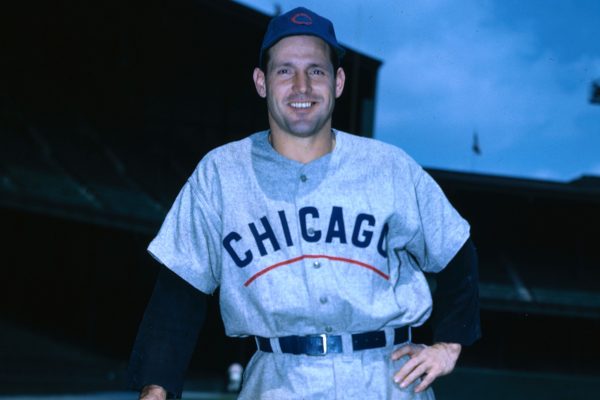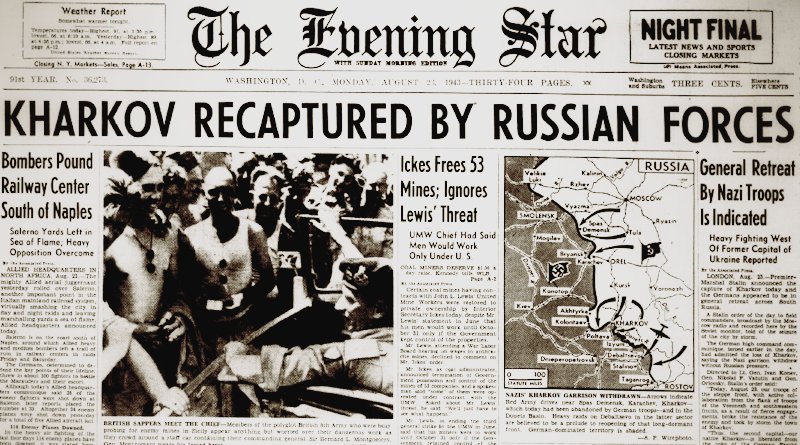World War II Chronicle: August 23, 1943
Click here for TODAY’S NEWSPAPER
George Fielding Eliot’s column on page six discusses the possibility of Japan facing a two-front war… Sports section begins on page 10, which says that big-league batters have hit 678 home runs this season. 20 have come from Chicago Cubs slugger Bill Nicholson, who has hit three home runs in his last five games. Nicholson will not be leaving baseball to fight in the war, which is ironic. Bill James explains why in his Historical Baseball Abstract:
As a boy [Nicholson] was obsessed with the idea of going to Annapolis and becoming a Naval officer. He read Navy books the way other boys read sports books, studied mathematics diligently, was a straight-A student, and wrangled an appointment to Annapolis on graduation from high school.
When he took his physical, however, the Navy doctors discovered that he was color blind. It is a perfect irony: while dozens of athletes who dreamed of nothing but being baseball players were busy fighting a war, perhaps the best player left in the National League was a man who had grown up dreaming of being a Navy officer.

Pvt. James M. Hill tells how a nail file given to him by his sister saved the lives of his machine gun section during the Battle of Tenaru last year (see page 25).
Roving Reporter by Ernie Pyle
SOMEWHERE IN SICILY — About the only superstition Omar N. Bradley has ever shown was when he was promoted to lieutenant general in June, just after the fall of Tunisia.
He knew his promotion had gone to Congress. He saw it published in the papers, and even received letters of congratulations from Washington — yet he wouldn’t pin on his third star until the official orders were actually in his hands, some weeks later.
General Bradley seldom gets nervous, and he is never excited. Once, here in Sicily, a sniper took a pot shot at him as he was riding in a command car, whereupon general and two enlisted men, armed only with carbines, got out of the car and started looking for the sniper. The sniper beat it, and they couldn’t find him.
On the day we launched our final victorious attack west of Mateur last spring, the general suddenly had nothing to do. He had planned and worked strenuously for weeks to prepare for it; but once it was under way he could only wait in personal inaction. That day did make him a little nervous, so he called two young captains who were his aides and they started out for a long walk. Back in the hills, far away from everything, they stopped and the captains threw rocks into the air while the general cracked them with his rifle. That was what he did while the battle was on.
General Bradley is notoriously good with a rifle. He has a sergeant driver who has been with him for years, and one reason he likes him so much is that the sergeant is a crack shot too.
In his younger days General Bradley was very athletic. He was a second-string football man at West Point, and a regular on the baseball team. Baseball is his greatest love. He played left field for three years at the Point, and back in the States he never missed a chance to see a big-league game. He still holds the record for the longest baseball throw ever made at West Point. He has forgotten now how far it was, but he says it “gets longer” by legend every year.
He is a good golfer, and in peacetime usually plays a couple of times a week. But when war was declared he gave up golf for the duration.
He and Mrs. Bradley both play bridge, and the general is a good poker player. He plays for moderate stakes and keeps a “poker fund” so that any losses can be paid out of that and not affect the family budget.
Hunting stands alongside baseball among his great loves. Back home he had two bird dogs — Molly and Pete. When he came overseas he gave Pete to an army friend, and Mrs. Bradley kept Molly. A third dog, named Tip, was 14 years old and died just before he left.
Back in Georgia, when he was commandant at Fort Benning, the General’s usual partners were some of his enlisted men.
General Bradley was born at Moberly, Mo., on Lincoln’s birthday of 1893.
His home town has recently named its airport after him, and while I was with him he received a letter from Moberly in an envelope all decorated with printed slogans about the “Dedication of Bradley Field — Home of Lieutenant General Bradley.” And there was a picture of him on the envelope. General Bradley looked at it and said, “it looks funny to get a letter with your own picture on it, doesn’t it?”
Bradley graduated from West Point in 1914. He rose to the temporary rank of major in the last war, but all his service was in the United States. Today he says:
“I’ve spent 25 years trying to explain why I wasn’t overseas in the last war, so thank goodness I’ll be spared that this time.”
They say that when he got orders to come overseas last winter he was as happy as a bug. During his long Army career Bradley served twice on the faculty at West Point, did one three-year hitch in Hawaii, spent many years at command schools preparing for just such a wartime job as he has now, and wound up in 1941 as a brigadier general in command of Fort Benning. There he expanded the officer candidate school, which last year turned out 40,000 new Army officers.
In February of 1942 he was made a major general and assigned to the command of the 82nd Infantry Division, and he was on that command when ordered to Africa.
His permanent army rank is that of colonel, and because of the fact that in achieving the wartime rank of lieutenant general he was passed over many men his senior, he leans over backward not to say or do anything that would make it seems he felt in any way above them.
More tomorrow.
Evening star. (Washington, D.C.), 23 August 1943. Chronicling America: Historic American Newspapers. Lib. of Congress.
https://chroniclingamerica.loc.gov/lccn/sn83045462/1943-08-23/ed-1/
